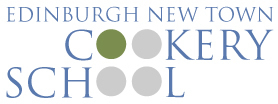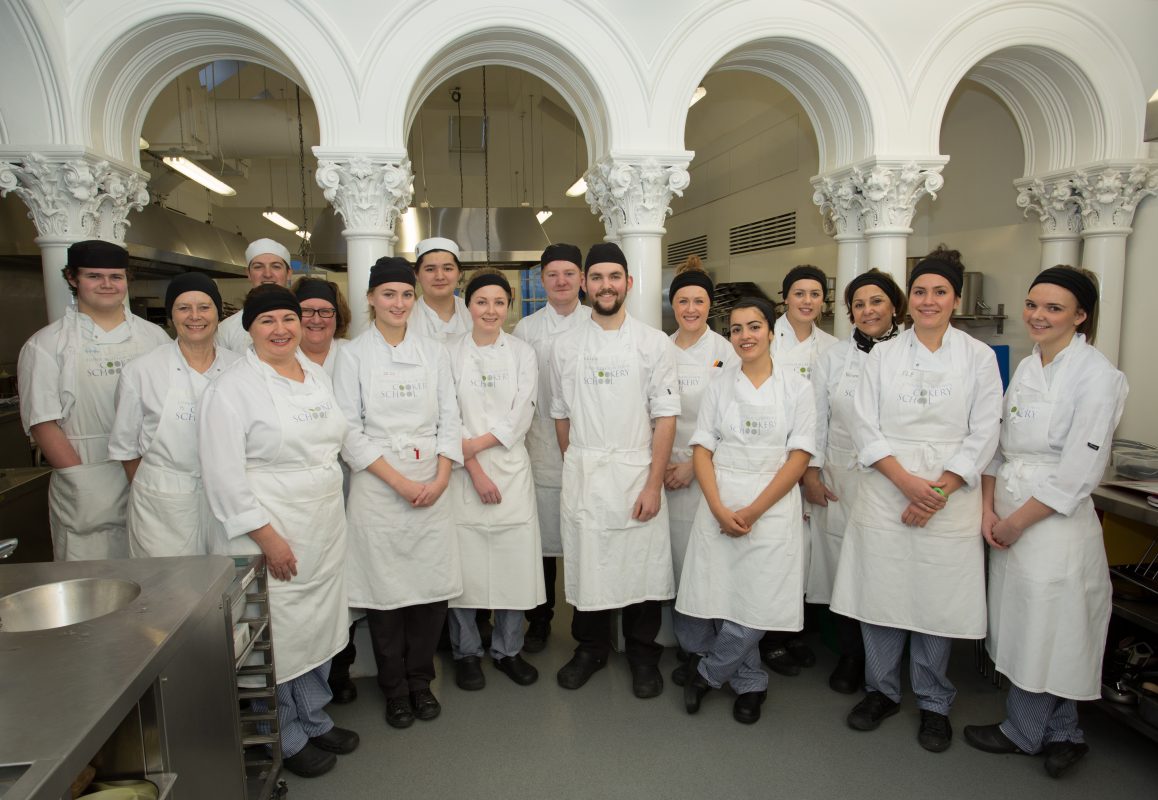News
A Student’s View from the Kitchen at ENTCS – Part 2
Sally Gardner recently completed the Three Month Intermediate/Advanced Course at Edinburgh New Town Cookery School which she passed with Distinction. We wish Sally well at the start of her new career and present the second half of her blog – A Student’s View from the Kitchen at ENTCS.
Part 2: Reflections on the Final Half Term
By Sally Gardner (April 2015)
Now that the course is over, the dust has just about settled and I have to say, I’m really rather missing it all; the cooking, the learning and the routine. In my last post, I highlighted the range of emotions felt in those early weeks, but whilst many of the demands of the course had become part of the routine and taken in everyone’s stride, the final few weeks were a crescendo of stress, nerves, excitement, elation and triumph. As I had hoped earlier in the term, the triumphs most definitely came from much greater successes than just hitting the deadline time for service!
The second half of the course rattled by so fast with various different projects all coming to a conclusion: we had our recipe development project, which had to be tried, tested and written up in time for the food photography days in early March; our portfolios needed the final tweaks and finishing touches to ensure they represented us and our developing style of cooking; we also had our work experience at the end of February, which was so valuable helping people see the goals ahead and even though a couple of people had a less-than-pleasant experience, they still learnt lots from it. Although people have this perception that professional chefs, particularly those working in the high-end, fine dining establishments, are all shouty, aggressive bullies, no one found that to be the case on their placements. Sure, in the pressure of a kitchen in the middle of service tensions can run higher and urgency is needed, but on the whole, most people reported back that they had witnessed and experienced a balance of encouragement as well as high expectations and standards.
To be completely honest, after we had finished our work experience, there was a general dip in motivation amongst us, but I think (certainly from my own perspective) it was borne out of returning to the comfort and familiarity of the cookery school kitchens after the intensity of the professional environment; routine can be so comforting and give your life structure, but it can also breed apathy. In addition, the adrenaline was missing and the exams were a little too far out of sight to push us on at that time. Having said that, the apathy didn’t last long and the approaching ‘Student Lunches’ (and impending exams) started to galvanise us all and we picked up the pace again.
The ‘Student Lunches’ were four events held over four different lunchtimes for family, friends and other invited guests (in many cases, the chefs who had hosted us for our work experience). We were put into groups of four with one person being assigned ‘Head Chef’; they were responsible for overseeing and co-ordinating the group meetings and, obviously, being in charge in the kitchen on the day of the lunch. Our tasks were to work together to devise a suitable menu made up of two courses with canapés and petit fours (three of each). In our group, we opted to serve a starter then the main course, although other groups chose to serve a dessert instead of a starter. Once we’d decided on our menu, we then had to cost it to ensure that it didn’t exceed the budget restrictions of £7 per head for a party of sixteen. If the menu came out as being too expensive, we had to go back to the drawing board to rejig it, cutting back on costs where we could to make it work. As well as working out the menu and budget, we had to establish and agree on who would be taking the lead on the different dishes to ensure that the work-load was spread equally. We were given marks based on our teamwork, the menu and the quality of the food, so it was important that everyone was involved in all aspects of it and that we worked co-operatively. I was very lucky with my experience of this because our group worked really well together and all four of us seemed to complement each other. The day of the lunch was not without its pressures and tensions, but overall the experience was very positive and the feelings of pride in our efforts were such a reward. I believe that everyone shared these feelings to differing degrees.
Our final week was mostly dominated by the exams looming ahead, although there was one treat for us on the final Monday before the intensity of the exam days ensued: ‘Chocolate Day’! Charlotte Flower from Charlotte Flower Chocolates (http://www.charlotteflowerchocolates.com/), based in Perthshire, came in to work with us for the day and teach us all about chocolate: the origins, the science, the cooking and the eating! We made ganache and flavoured it with our choice of flavouring, whether that was alcohol or spices or some other interesting taste, then once set, the mixture was rolled into truffles. We then learnt about tempering chocolate to ensure it has that clean snap when you bite into it; this was put into practice in the kitchen where we coated the truffles with tempered chocolate and tried to make them as professional-looking as possible, which those around me certainly managed! I have to say that I was rather pleased with mine as well and they were tasty and indulgent (I chose Drambuie as my flavour), although there was still room for improvement in the dipping process to avoid a very flat base…I’m happy to keep perfecting the art, though!
After the relatively relaxing ‘Chocolate Day’, we had our theory exam first on the Tuesday afternoon, but we had been split into two groups for our practical exam, with one group on the Wednesday and the next group on the Thursday. As with all exams, preparation is the key and, having been a teacher for the past decade, it was now time to practise what I had preached all those years. It was interesting with the shoe being on the other foot; reciting culinary theory to my flatmate as she tested me on my knowledge took me right back to my own school days…in fact, I might’ve been more successful in the sciences at school had I done more of this!! On average, most people completed the written exam in about an hour, but we had been given as much time as we needed (within reason, of course!); although, you either know it or you don’t. The practical exam was probably what we were all most apprehensive about because there are so many factors that can impact the success of the outcome. We all knew we could cook the dishes, but the test came from our ability to cook them all within the limited time frame (four and a half hours), displaying the skill needed to create a perfect version of the dish and get all elements ready on time. Without giving you a blow-by-blow account of each dish, they all posed various challenges: some involved a lengthy process, some required all the elements to be brought together at the last minute, some needed the skill to judge just the right moment to stop cooking and some needed the skills of presentation; so it was testing, but not impossible.
The relief when it was all done was over-whelming, although tinged with a little sadness that it meant the end of the course and the end of the familiar routine, which had grown so comforting. It meant we all needed to face the realities of what came next. Were we going to apply for jobs in commercial kitchens? Work freelance with catering companies and private clients? Or maybe follow one of the other many available career paths in the food industry these days? Some had clear ideas, some didn’t, but we all left with a sense of confidence in our abilities as cooks ready to start on a new path and an excitement about where that journey would lead.

The author!

Food Photography piece

Chocolate Truffles

Jambonneau de Poulet

Gateau St Honore

